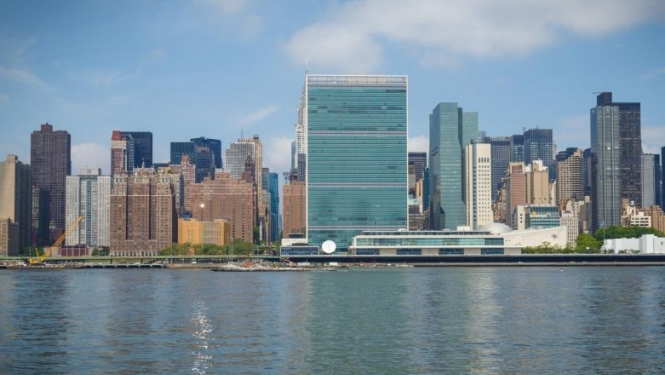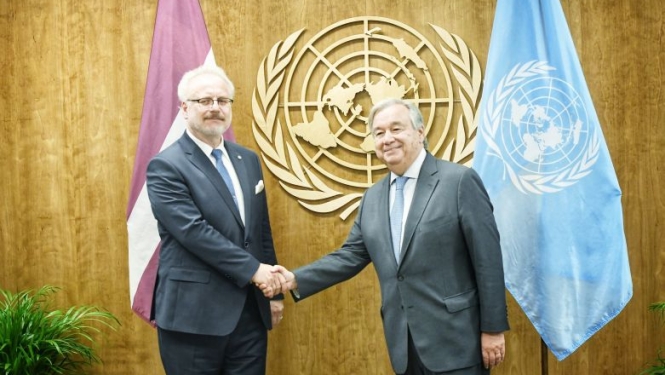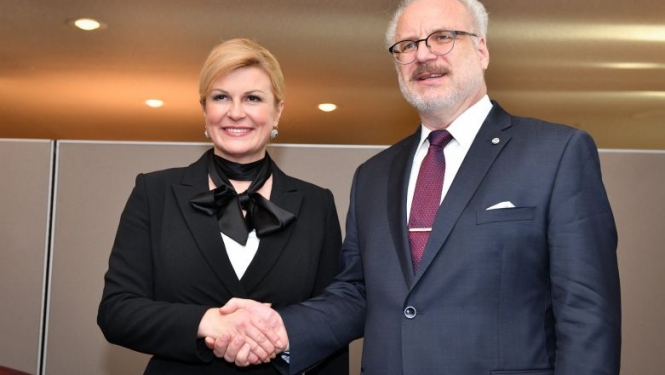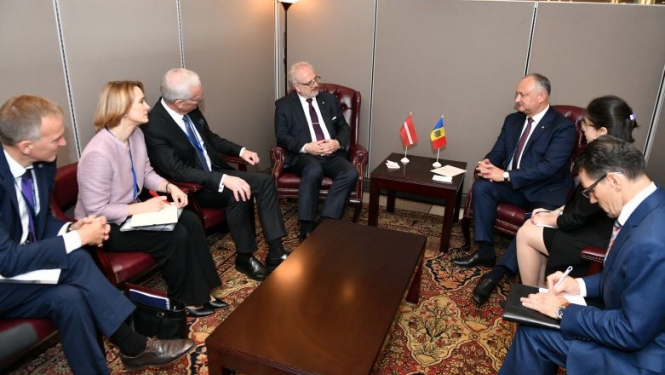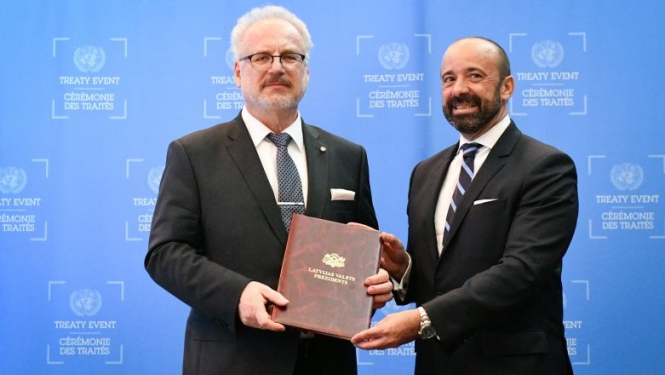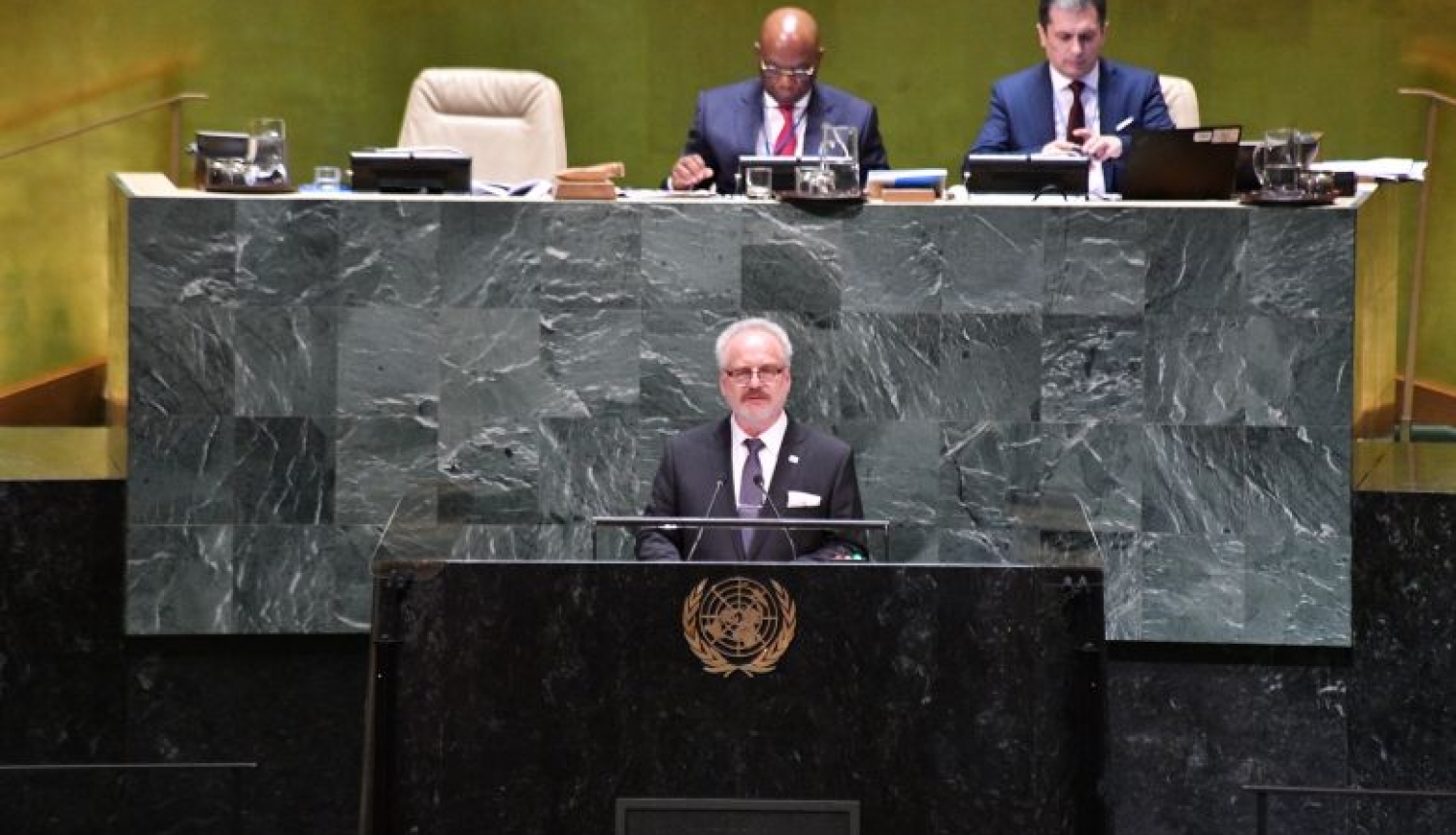
Mr President,
Excellencies,
ladies and gentlemen,
I Introduction
I am greatly honoured to address the United Nations General Assembly for the first time. Let me congratulate you, Mr President, on assuming the Presidency of the 74th session of the General Assembly. I can assure you that Latvia will provide active and constructive support to our joint efforts during this session.
30 years ago, as a young politician and lawyer I had the opportunity to fight for the restoration of my country’s independence.
Latvia, like Estonia and Lithuania, was occupied by the Soviet Union at the beginning of World War II. Unlike the Western part of Europe, where the war ended in 1945, the Baltic states only regained their independence in 1991. We will forever be grateful to those states that never recognized the occupation of our countries as legitimate (de iure).
Our independence was regained through strong mass movements, whose demands were rooted in international law. This was the result of a non-violent freedom fight – a rare occurrence in history.
At the same time, it was a triumph for international law. It proves that even apparently hopeless situations can be overcome by belief in the law and strong civil society. Sooner or later, justice will always prevail!
In the following 25 years I had the privilege to serve as judge in two international or supranational courts – first the European Court of Human Rights, then, the European Court of Justice.
This explains why justice and the rule of law at the national and international level is so important for the Latvian state, for the Latvian nation, and also for me personally.
I was therefore gratified earlier today to deposit Latvia’s declaration of joining the jurisdiction of the International Court of Justice as yet another sign of Latvia’s strong commitment to the rule of law and a rules-based international order.
II International Law and Rule of Law
Mr President,
A strong multilateral, inclusive, rules-based international order is essential for the maintenance of global peace and security. It must be our joint responsibility to defend and strengthen it. The United Nations is and must remain the central forum for multilateralism and a rules-based global order.
Experience shows that our goals are best achieved through cooperation in multilateral fora. With this aim Latvia actively seeks opportunities to contribute to a more peaceful, just world. For example – over the last year Latvia is proud to have presided over the 5th conference of States Parties to the Arms Trade Treaty.
The multilateral order also demands that territorial integrity and sovereignty, as enshrined in the purposes and principles of the UN Charter, is respected by all UN Member States.
Here I must point to Russia’s open disrespect for the principles of international law, as violation of Ukraine’s and Georgia’s territorial integrity continues. Such brazen disregard for international law must not be accepted as the “new normal”.
Latvia’s experience shows that rule of law, like democracy and respect for human rights, is an important catalyst for the successful development of a state. Latvia will therefore strongly support the consolidation of these principles in international law.
III Hybrid threats to states and democracy
Nowadays violations of international law are committed not only through direct military force, but increasingly through disinformation, cyberattacks, economic influence, energy pressures and interference in election processes.
Since hybrid threats do not recognize national borders, no country is immune.
The United Nations can be and must be a significant global player to promote peace, security and stability in cyberspace.
Latvia is ready to participate actively in discussions and share its experience in promoting responsible behaviour in cyberspace and boosting institutional and individual resilience to malicious intent.
IV Digital technologies
Certainly, digital technologies have brought progress for humanity. However, we must be careful to prevent malicious use of these technologies. There is no excuse for unintended or unexpected consequences that undermine our societies. The technologies need to be developed with greater responsibility and accountability.
We must be aware of the impact of technological advances on human communication and connectivity. Vast amounts of personal data are collected every second by state and non-state actors. Our private communications, our health, our location and movements can be constantly monitored. In recent times, facial recognition is increasingly used. We are coming under constant surveillance. Yet the rules governing the ownership, authorization and protection of this data are opaque, to say the least. Our data can easily become a threat to our freedom and our privacy.
When we feel that we are being observed, we often adjust our behaviour and speech. The potential risk to independence of our thought and action will only grow in the coming years, given the rapid development of Artificial Intelligence. We must not allow Artificial Intelligence to take legally binding decisions instead of humans. Humans must retain control.
Therefore, the UN must actively promote discussion of personal data protection in cyberspace, especially the ethical and legal standards for the collection and use of personal data.
An intensive public discussion on risk reduction is necessary at the national, regional and global level. The international level is essential, as cyberspace is global. Latvia considers the Report of the UN Secretary General’s High-level Panel on Digital Cooperation and his Agenda for Disarmament addressing key technology security concerns to be a useful stimulus for more intensive exchange of ideas in this area.
V Climate change
Mr President,
The climate, too, is global. Climate change must be tackled at international, state and individual levels. We must collaborate across borders to mitigate the negative impacts of climate change.
Empowerment of youth can play an important role in climate action, as we recently witnessed in the Youth Climate summit.
Likewise, technologies have a leading role in healing our planet. Innovations together with computing power and connectivity allow us to become more efficient. I am proud that Latvian IT companies are willing to take up the challenge and have joined the Green Pledge launched by our neighbours Estonia.
Latvia is committed to the goals of the Paris Agreement. In Latvia we have reduced our greenhouse gas emissions by almost 60 % compared to 1990 levels but we understand that it is not enough, and therefore we support climate neutrality as a goal for the future. We are currently working on an ambitious low carbon development strategy that would allow Latvia to reach climate neutrality by 2050.
Earlier this year the Government of Latvia approved the National Climate Change Adaptation Plan for 2030. It sets out concrete actions on adaptation to be implemented in the nearest future.
According to Latvia’s experience, one of the substantial solutions to mitigate climate change is sustainable forest management, which provides continuous carbon sinks and sustainable forest products that can substitute fossil-based materials, thus reducing emissions. Forest coverage in Latvia has increased almost twice since the first half of the last century. Latvia is committed to sustainable forest management for current and future generations.
Meanwhile, our civil society, too, is making efforts – on World Cleanup Day, 21 September, trees were planted all around Latvia by individuals, young and old, as a contribution to a sustainable future. This builds on a long-standing volunteer tradition in my country to promote a clean environment.
VI Sustainable Development Goals – Agenda 2030
Mr President,
Latvia remains a strong advocate of the Agenda 2030 to achieve the Sustainable Development Goals both nationally and globally. Sustainable development goals have changed the way how we plan our own long-term National development strategy. At national level we focus on two main directions – promoting an innovative and eco-efficient economy and reducing inequalities.
I believe that gender equality and women’s empowerment is not only the right thing to do, but also the smart thing to do from the economic perspective. Latvia shows leadership in this field – according to the World Economic Forum Global Gender Gap Report of 2018, Latvia is one of the few countries in the world that has closed the gap both in terms of health and survival and in educational attainment, and is above the 80 % milestone for economic participation and opportunity.
Through bilateral development cooperation programs Latvia is contributing to the implementation of the Agenda 2030, particularly in the EU Eastern neighbourhood and Central Asia. We share the lessons we have learned throughout our own transition experience to a democratic state based on rule of law.
VII Conclusion
30 years ago, 2 million people made a 600 km long human chain through Estonia, Latvia and Lithuania, called the Baltic Way, to demonstrate our wish for freedom. The Baltic Way and the fall of the Berlin Wall marked the end of the Cold War. Latvia was finally able to join the United Nations. We have actively used the opportunities provided by multilateralism through this unique global body.
My country and my people have experienced impressive change over the past 30 years. I believe that the UN, too, can adapt to resolve the global challenges of today. Let us use the run-up to the 75th anniversary to make the UN more purposeful and valued by working with renewed determination toward its own reforms, notably in the Security Council. The UN must evolve to stay effective.
All the principles enshrined in the UN Charter are as relevant today as they were 74 years ago, when it was adopted. I am gratified that Latvia now has the freedom to enjoy these principles within its borders, and the responsibility to uphold these principles across the globe.
Thank you!





